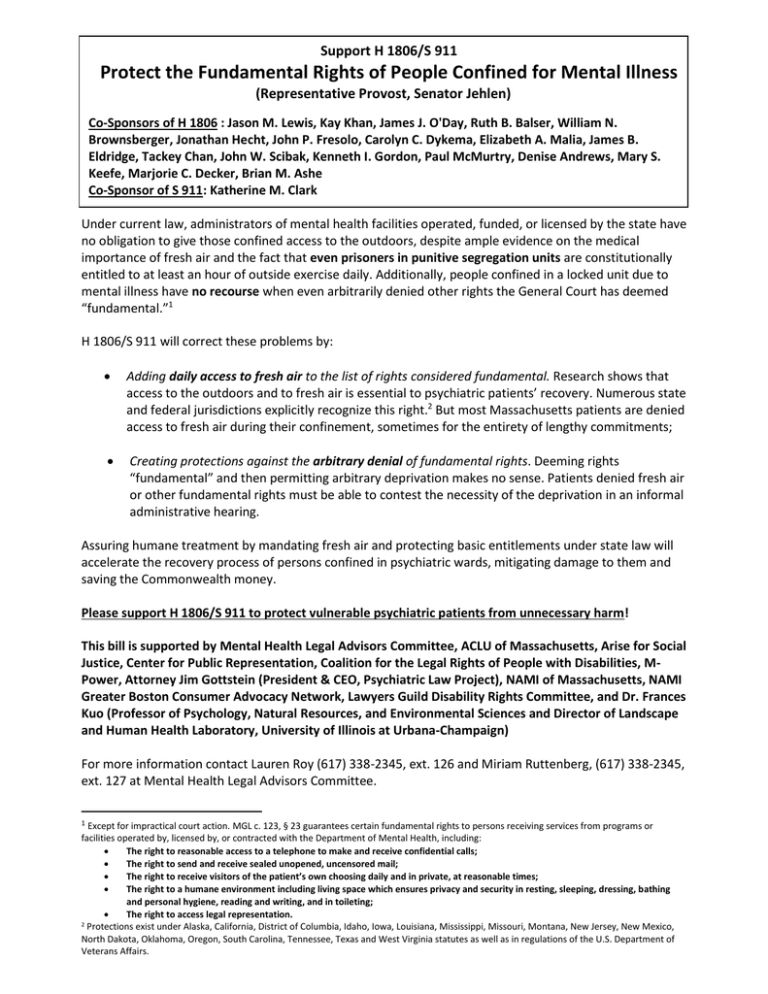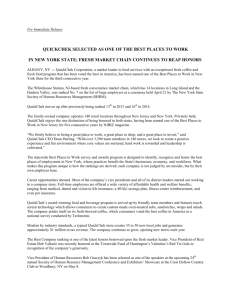FACTSHEET fresh air fact sheet H1806 S 911. 9.4.13
advertisement

Support H 1806/S 911 Protect the Fundamental Rights of People Confined for Mental Illness (Representative Provost, Senator Jehlen) Co-Sponsors of H 1806 : Jason M. Lewis, Kay Khan, James J. O'Day, Ruth B. Balser, William N. Brownsberger, Jonathan Hecht, John P. Fresolo, Carolyn C. Dykema, Elizabeth A. Malia, James B. Eldridge, Tackey Chan, John W. Scibak, Kenneth I. Gordon, Paul McMurtry, Denise Andrews, Mary S. Keefe, Marjorie C. Decker, Brian M. Ashe Co-Sponsor of S 911: Katherine M. Clark Under current law, administrators of mental health facilities operated, funded, or licensed by the state have no obligation to give those confined access to the outdoors, despite ample evidence on the medical importance of fresh air and the fact that even prisoners in punitive segregation units are constitutionally entitled to at least an hour of outside exercise daily. Additionally, people confined in a locked unit due to mental illness have no recourse when even arbitrarily denied other rights the General Court has deemed “fundamental.”1 H 1806/S 911 will correct these problems by: Adding daily access to fresh air to the list of rights considered fundamental. Research shows that access to the outdoors and to fresh air is essential to psychiatric patients’ recovery. Numerous state and federal jurisdictions explicitly recognize this right.2 But most Massachusetts patients are denied access to fresh air during their confinement, sometimes for the entirety of lengthy commitments; Creating protections against the arbitrary denial of fundamental rights. Deeming rights “fundamental” and then permitting arbitrary deprivation makes no sense. Patients denied fresh air or other fundamental rights must be able to contest the necessity of the deprivation in an informal administrative hearing. Assuring humane treatment by mandating fresh air and protecting basic entitlements under state law will accelerate the recovery process of persons confined in psychiatric wards, mitigating damage to them and saving the Commonwealth money. Please support H 1806/S 911 to protect vulnerable psychiatric patients from unnecessary harm! This bill is supported by Mental Health Legal Advisors Committee, ACLU of Massachusetts, Arise for Social Justice, Center for Public Representation, Coalition for the Legal Rights of People with Disabilities, MPower, Attorney Jim Gottstein (President & CEO, Psychiatric Law Project), NAMI of Massachusetts, NAMI Greater Boston Consumer Advocacy Network, Lawyers Guild Disability Rights Committee, and Dr. Frances Kuo (Professor of Psychology, Natural Resources, and Environmental Sciences and Director of Landscape and Human Health Laboratory, University of Illinois at Urbana-Champaign) For more information contact Lauren Roy (617) 338-2345, ext. 126 and Miriam Ruttenberg, (617) 338-2345, ext. 127 at Mental Health Legal Advisors Committee. 1 Except for impractical court action. MGL c. 123, § 23 guarantees certain fundamental rights to persons receiving services from programs or facilities operated by, licensed by, or contracted with the Department of Mental Health, including: The right to reasonable access to a telephone to make and receive confidential calls; The right to send and receive sealed unopened, uncensored mail; The right to receive visitors of the patient’s own choosing daily and in private, at reasonable times; The right to a humane environment including living space which ensures privacy and security in resting, sleeping, dressing, bathing and personal hygiene, reading and writing, and in toileting; The right to access legal representation. 2 Protections exist under Alaska, California, District of Columbia, Idaho, Iowa, Louisiana, Mississippi, Missouri, Montana, New Jersey, New Mexico, North Dakota, Oklahoma, Oregon, South Carolina, Tennessee, Texas and West Virginia statutes as well as in regulations of the U.S. Department of Veterans Affairs.





